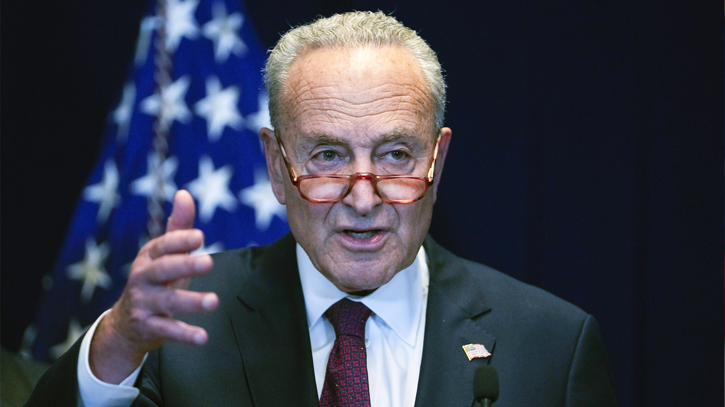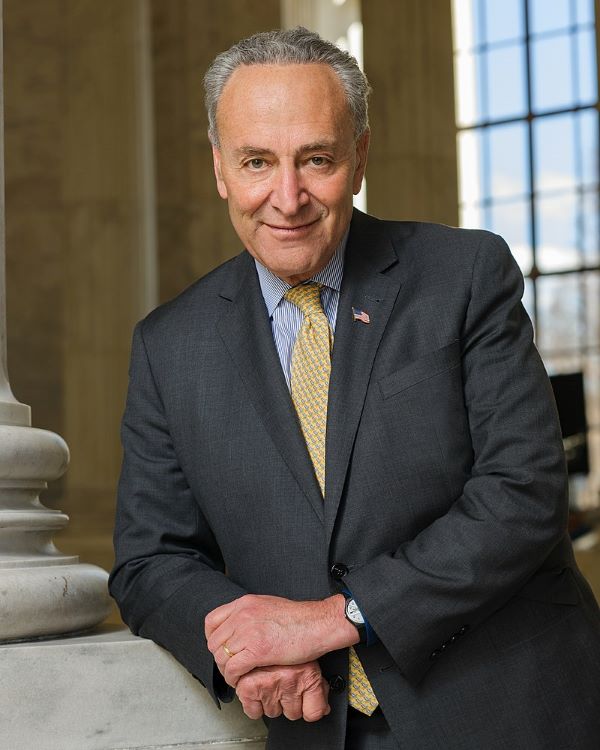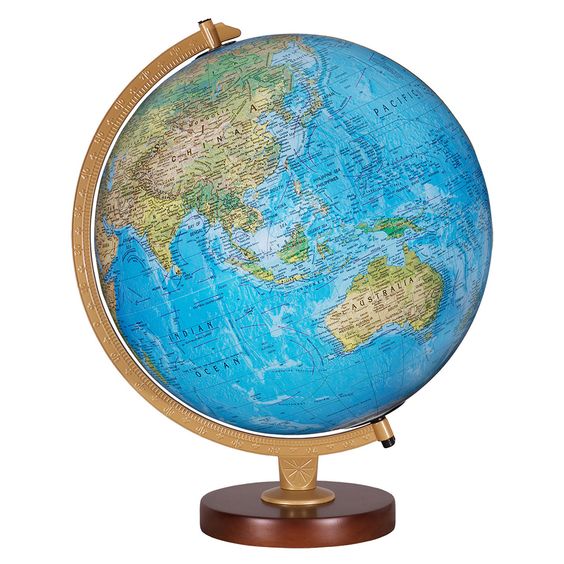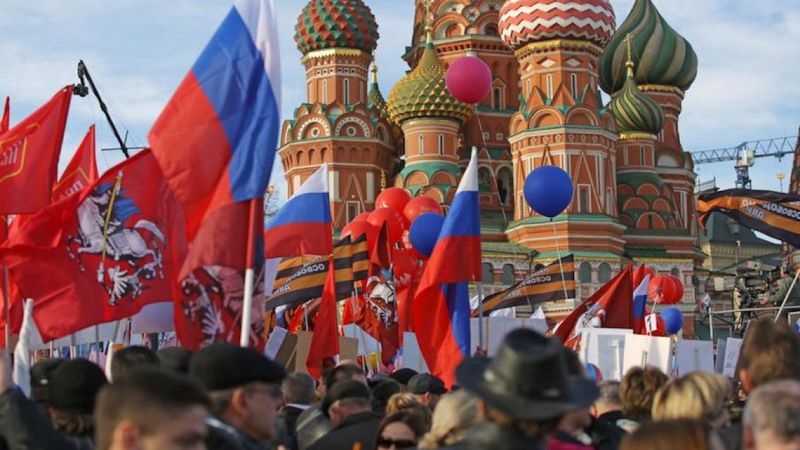
Senator Chuck Schumer is America’s senior American politician, and when he attacks Netanyahu government, people sit up and take notice
By Tom Arms
Senator Chuck Schumer is America’s senior American politician. He is also the Senate Majority Leader. So when attacks the government of Israeli Prime Minister Benjamin Netanyahu and calls for fresh elections to oust him, people sit up and take notice.
The left-wing of the Democratic Party love it, and it is doubtful that Schumer would have spoken without first clearing the speech with his close friend and political ally President Biden.
The Israeli government is furious. “Israel is not a banana republic,” it fumed. “Senator Schumer is expected to respect Israel’s elected government and not undermine it. This is always true and even more so in time of war.”
The Israelis words were echoed by ranking Senate Republican Mitch McConnell. As soon as Schumer sat down, McConnell jumped to his feet to rebut: “Israel is not a colony of America…. Only Israelis should have a say in who forms their government. Either we respect their decision or we disrespect their democracy.”

Read: Top Democrat Schumer calls for new elections in Israel, saying Netanyahu is an obstacle to peace
And therein lies the rub. With all its faults—and it has many—Israel is a vibrant democracy. Its oft-held general elections regularly achieve turnouts of between 60 to 70 percent. There is a lively free press and the public are free to take to the streets and demonstrate whenever—and they do, often. They also keep re-electing Netanyahu.
The latest opinion polls, are not, however, good news for the prime minister and his Likud Party. They show that Likud would drop thirteen Knesset seats from 33 to 20 if an election was held today. The big winner would be Benny Gantz’s National Unity Party who are expected to jump from 20 to 32 seats.
Gantz has called for a “two entity” solution to the Arab-Israeli problem. He has not, however, defined “entity” and so far has supported Netanyahu’s attacks on Gazans and refusal to accept a ceasefire. Israeli can no longer live alongside Hamas, he said, “this reality has to change.”
A Gantz government is unlikely to bring peace. This is because most Israelis are not in favor of the conditions that would create it.
For a start, to form a government, Gantz would need 61 out of the 120 Knesset seats. The problem is that – other than roughly 10 seats held by Israeli-Arab politicians—only one political party, Meretz, is wholly committed to the two-state solution. They currently have no Knesset seats and are projected to win only five if an election was held now. The Center-right Yesh Atid led by former TV anchor Yair Lapid, endorses talking with the Palestinians and an end to West Bank settlements. But it stops short of the two-state solution.
The fact is that every opinion poll shows strong support for the war, opposition to a ceasefire, hatred of Palestinians and hostility towards the two-state solution. For instance, one would have thought that students would hold the most liberal thoughts towards the Gazans. But a poll last month at Tel Aviv University revealed that less than two percent thought the Israel Defence Force (IDF) was using too much firepower. 55 percent thought they were using too little.
Read: Top Democrat Chuck Schumer calls for new Israel election as rift grows
A poll taken by Israel’s Channel 12 at the end of January reported that 72 percent of Israelis said Humanitarian aid into Gaza “must be stopped until the Israeli hostages are released.” On February 1, hundreds of demonstrators managed to block an aid convoy.
The underlying cause for support for the war is a socially and politically conservative electorate. In 1990, the ultra-Orthodox community was five percent of the population of Israel. In 2023 it was 15 percent and within two years it is projected to be 20 percent. They are a solid anti-Palestinian bloc vote, which is why the projected share of Orthodox seats in the Knesset is expected to be virtually unchanged.
Of course, not all Israeli Jews are religious. In fact, a 2016 poll indicated that only 30 percent thought religion was important. But in a January 2024 poll, a staggering 93 percent believed that all the land between the Mediterranean and the River Jordan (“from the river to the sea”) belonged to the Jewish nation.
As the famous Israeli historian Ilan Pappe ironically wrote: “We do not believe in God, but he nevertheless promised us Palestine.” Pappe’s liberal leanings led to death threats, lecture boycotts and calls for him to be sacked by the Israel Minister for Education. Pappe left Israel in 2007 and now teaches Middle East studies at Britain’s Exeter University.
If an election was held in Israel today Netanyahu would lose. But he would NOT lose because he refused to negotiate with the Palestinians or because he backs annexation of the West Bank or opposes the two-state solution. He would lose because the October 7 Hamas attack occurred on his watch.
Read: Observations of an Expat: Middle East Movement
 World Review
World Review
It was the Trump-Orban love fest in Mar-a-lago last weekend. The Hungarian Prime Minister praised the ex-president as “the president of peace.” Trump went several steps further: “There is nobody that’s better, smarter or a better leader than Viktor Orban,” he enthused.
President Joe Biden failed to agree with Trump’s assessment. He referred to Orban as a wannabe dictator, and attacked Trump for meeting him, let alone praising him.
Biden’s man in Hungary, Ambassador David Pressman, was even more undiplomatic in his language, which could herald a looming clash between the Biden Administration and Europe’s darling of the right-wing populists.
In a speech on Thursday to mark the 25th anniversary of Hungary’s joining NATO, Ambassador Pressman warned the Hungarian prime minister that the US has lost patience with his embrace of Russia’s Vladimir Putin, attacks on the Biden Administration, his undermining of support for Ukraine, and his open advocacy of Trump’s return to the White House.
He said: “We cannot ignore it when the Speaker of Hungary’s National Assembly asserts that Putin’s war in Ukraine is actually led by the United States. We cannot ignore a sitting minister referring to the United States as a corpse whose nails continue to grow. We can neither understand nor accept the Prime Minister identifying the United States as a ‘top adversary’ …or his assertion that the United States government is trying to overthrow the Hungarian government—literally, to ‘defeat’ him.”
The ambassador called out Orbán’s “systematic takeover of independent media,” the use of government power to “provide favourable treatment for companies owned by party leaders or their families, in-laws, or old friends,” and laws defending “a single party’s effort to monopolize public discourse.”
Pressman added: “Hungary’s allies are warning Hungary of the dangers of its close and expanding relationship with Russia. If this is Hungary’s policy choice—and it has become increasingly clear that it is with the Foreign Minister’s sixth trip to Russia since Russia’s invasion of Ukraine, and with his next trip to Russia scheduled in two weeks, following his engagement with Russia’s Foreign Minister earlier this month, and the Prime Minister’s meeting with Vladimir Putin in China—we will have to decide how best to protect our security interests, which, as Allies, should be our collective security interests.”
***
It is presidential election weekend in Russia. The bookies favorite—surprise, surprise—is Vladimir Putin.
It is also just over two years since Russia invaded Ukraine, so the two combined events provide an excellent opportunity to assess how events and political thought processes have changed over the past two years.
The Putin regime has rebuilt every element of itself to adapt to a permanent state of war: in propaganda and everyday life, in the political model of unifying the behavior of the elites and ordinary people, in the education and justice systems, and—crucially—in the economy.

Read: Russians crowd polling stations in apparent protest as Putin is set to extend his rule
Russia is no longer an authoritarian regime that requires only silence from the people. It is a totalitarian regime that demands complicity. People must pay their dues to the state by sacrificing their loved ones in the trenches, attending mass rallies in support of the war, and performing socially approved activities. These include reporting a colleague, a student, teacher, or neighbor for expressing opposition to the war. Attending an anti-war demonstration will land you in prison. Putin faces three opponents at the ballot box. But none of them have been allowed to oppose the war in Ukraine.
The all-pervasive totality of the state has saturated the media, movies, and theatre. It has permeated the book market, changing the rules of the Russian language by abolishing feminine gender-specific job titles as a sign of sympathy for LGBTQ rights. Books by best-selling authors are banned and the authors are branded “foreign agents.”
Putin needs enemies to win supporters. NATO, the West, the LGBTQ community. They are not only a threat to him. They are a threat to Russia. And Russia is special. It is exceptionalism and greatness on steroids. In Putin’s view of the world, Russia and the West are locked in a battle to destroy the superior Russian identity.
To preserve Russia’s identity, Putin believes he has to reconstruct the world order to eliminate post-war American dominance. The “special operation” began with the logic of protecting ethnic Russians in Ukraine. It has morphed into a war with the West. And In Putin’s Alice in Wonderland world, it is the West—through Ukraine—who has attacked Russia.
To those who remember the Cold War years, Putin’s revolutionary language sounds very similar to that of the Soviet leaders. The difference is that the communist revolution was rooted in internationalism while Putin’s world revolution is embedded in Russian nationalism.
***
It was a good news bad news week for Europe’s populist right. The really good news came out of Portugal where the far-right Chega Party quadrupled its share of the vote to come in third in the country’s general election.
The Socialists—who have been in government for the past eight years—are now out on their ear. They came in second to the center-right Democratic Alliance led by Luis Montenegro who just squeaked into first place with 79 seats.
Montenegro now faces the unpalatable choice of trying to navigate the choppy waters of a minority government or forming a coalition with the outgoing socialists or the upcoming Chegas.
The Leader of the Democratic Alliance has repeatedly refused to work with Chega, which he described as “xenophobic, racist, populist and excessively demagogic.” Chega leader Andre Ventura denies that his party is xenophobic or racist, he insists that they just want to limit immigration and have a Portugal—and Europe—based on “Greco-Roman and Judeo-Christian values.”
Meanwhile, in the Netherlands, far-right populist Geert Wilders appears to have given up trying to form a government and secure the job of prime minister. He has basically come up against a political brick wall. Nobody wants to work with him. He is regarded as politically toxic.
Wilders shocked the European political establishment when his far-right Freedom Party (PVV) came out top of the list in a general election late last year. He won 37 seats. Unfortunately, for Wilders ambitions, this was about half of what he needed to form a government.
The PVV’s policies were just too extreme for the rest of the Dutch political establishment. Wilders wanted the Netherlands out of the EU. He said the Koran was worse than Mein Kampf and wanted it banned. Muslim immigration to the Netherlands must stop immediately and Muslims already in the country would be paid to leave.
Four of the smaller parties did enter into negotiations. They were attacked for doing so. Wilders watered down some of his more extreme policies, but it was too little too late. At one stage, the potential partners considered an arm’s length coalition. None of the party leaders would take a cabinet position. Instead ministerial posts would be held by “technical experts” and “experienced politicians.” This was eventually rejected as unworkable. Wilders gave up and the Dutch have returned to the coalition-building drawing board.
__________________
 Tom Arms is foreign editor of Liberal Democratic Voice and the author of “The Encyclopaedia of the Cold War” and “America Made in Britain.” He also co-hosts the regular world affairs podcast “TransAtlantic Riff” https://open.spotify.com/show/3ntjretAKNLZNFpA5ZEGDG
Tom Arms is foreign editor of Liberal Democratic Voice and the author of “The Encyclopaedia of the Cold War” and “America Made in Britain.” He also co-hosts the regular world affairs podcast “TransAtlantic Riff” https://open.spotify.com/show/3ntjretAKNLZNFpA5ZEGDG
[…] Read: Observations of an Expat: US Senator Schumer suggests ousting of Netanyahu […]